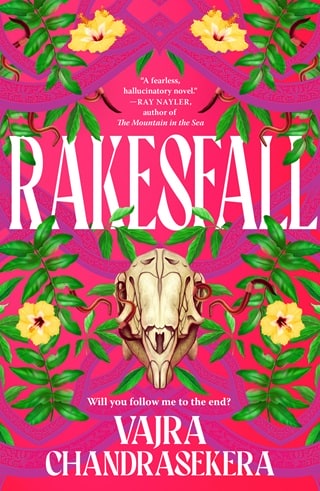Chapter 15 Beginning’s End
Vidyucchika opens her eyes on a train. Lambajihva is still sitting opposite her. Now his eyes have a little more focus. She sees the moon in them briefly before he blinks.
"Well," she says. Her voice is unsteady; whose voice is this? "That's the end of the beginning. Where do we go from here?"
Lambajihva tries to answer, but his dead tongue will not obey. The floor of the car is a sea of maggots, though she can no longer tell their focus or source.
"Yes, yes," she says. "Next is the beginning of the end. Let's go already." She studies his face. "I suppose we have some things to say to each other."
How The Red Witch Lost Her Pelt, and Other Stories
Once upon a country, there was a war. The Wikipedia entries, so contested that there is another war in their edit histories, will tell you there were two sides, but each side is dodecahedral and rotating, or perhaps eight-celled hypercubes occupying the same space, their inner surfaces as deeply scored and stained as the outer. In that war there was a knocking at the gate, a rapping and a banging of fist on metal, a summoning out of the living into the dead of night. This knock was called the knocking of death, whether performed by the most secret of police or by the swarming militaries and paramilitaries, the ur-militaries, fritillary and flapping. A fritillus is the cup that holds the dice, grooved on the inside so that the dice will rattle and spin when you throw. The dice fall where they may; the dice fall as they will. Some nights Vidyucchika lies awake in her parents' house and imagines the knocking so vividly that she gets up, half asleep, and walks halfway to the door before she wakes up all the way and remembers that it was only a dream of death visiting.
She knows why it will come, when it comes. Her parents know, too. It could hardly be a secret in this house, so it is merely unspeakable. It is because her parents keep opening doors that they should leave well alone. Her father and her mother have made this house's doors too open; people come and go, a way station out of nowhere to somewhere. It is quiet work, not dramatic. The conversations on the phone are bluff and genial and gossipy, not whispers or pleas, with the important parts happening almost by the by. When strangers, often whole strange families, carrying either too many belongings or too few, stay in the spare bedroom, Vidyucchika is told to tell anybody who asks that these are aunts and uncles and cousins visiting. A few days later, after more of those phone calls, they're gone again, in vans and trucks heading for planes and trains and at least once, Vidyucchika overhears, a boat. Boats are a last resort because her parents do not overlap with the underworld, merely a shallow underground or two.
She doesn't have to ask why these strangers need to leave the city. She is a child, but not that much of a child. Her objection is much more grown-up, she feels; her parents are sticking their necks out too far, it's bound to cause trouble.
"It's irresponsible," she tells Father, who laughs at the word as if it means less because it's in her mouth. Father is impossible to talk to about this. It's as if he's the child, willful, giggly, unwilling to listen to reason.
"You'll get us in trouble," she tells Mother, who nods, yes, yes, we probably will. Mother listens patiently when Vidyucchika wants to talk, and she agrees with her daughter that all this is a bad idea, that it will end badly for them. She says that maybe it started out as the merest attempt to salve their own burning egos, their fragile sense of themselves as upright people in these troubled times; that maybe it started as a one-time thing, just a friend who needed some help, then a friend of a friend, then… "Bad things will happen," Vidyucchika says. "We should go, too. Let's go wherever everyone else goes to be safe."
"It's different for us," Father says. "We're safe here. We bear the mark of the patricide, see?" And he raises his mop of curls up to the hairline as if to show some mark carved into the skin of his forehead, but there's nothing there but dry skin. Mother whacks him on the shoulder.
"What's a patricide?" Vidyucchika wants to know, but Mother won't let Father answer that one, and she imagines for years that it is the name of the side they are on, the Patri Side, the patria for which they will mori, so sweet and cold.
War and girl grow a little older; parents stay the same. The knocking gets closer every night, until one night she sits up bolt upright with her heart hammering at the softest nighttime knock. The knock comes again, so either she did not dream it or she is still dreaming; she gets up and walks through the house in the dark, her long cotton nightdress heavy with the sweat of her terror. The luminous hands of the clock on the wall say it's the third hour of the midnight watch. Her parents are light sleepers before midnight, but afterward they are dead to the world. Vidyucchika drifts to the door as if in a nightmare; she peers through its frosted glass, but there is only one shape outside, too small to be the most secret of police. She unlocks and opens the door to find a boy she has never seen in this life, and whose face she knows—whose long earlobes she knows so well that they start a sudden ache in her chest, as if a lung had given way, or a ventricle gone rotten like a bad tooth.
"Lambakanna," she greets him, giving him a nickname at the same time. Long-ears. He touches his ear wonderingly; perhaps nobody in this life has ever remarked on them before. He is dirty, as if he's been sleeping rough. He is about her age. He is alone. It's very cold outside. Her bare arms horripilate in the touch of the night air.
He says something, counters with his real name, maybe, but she doesn't hear it.
"You can't be here," she says. She's whispering because she doesn't want her parents to wake up, and because the pain in her chest has not faded and she can't muster the breath. "There's no help for you here. You have to go away."
And she closes the door in his face, and she watches his shape through the frosted glass while he whispers urgently and taps again. When he leaves it's like a dream, a shape already indistinct that fades into the surrounding darkness the moment it takes a step back.
She says nothing to her parents in the morning. She puts it out of her head. For weeks she sleeps well, during which she comes to think it may have been a dream. It had that unreal quality, that sense of worlds ending. Then one ordinary day death comes knocking, and her parents put her in the ceiling crawl space and go back down to die, and while they are dying, she looks around in the crawlspace and discovers she is not alone. She can't move much; the crawl space is very small, child-sized, and the crossbeams thin and of inferior wood. Light as she is, she must distribute her weight and lie still, listening to the tumultuous death of her parents below, veiled by ceiling panels. When she raises her face to look directly ahead into the darkness of the crawl space, about the only movement she can make without risking collapse, a face appears out of those shadows before her: a boy's face that she has seen only once before in this life, a mirror face she knows better than her own. She knows instantly that he has been dead for a while; his eyes are unfocused, his tongue hanging out of his mouth. His jaw works as if he's trying to talk; it is so wide open it looks dislocated. A maggot falls from the corner of his lip and onto the ceiling panel between them—the first of the maggots he gifts her. It makes a sound like a very small drumbeat. This is the moment the fever blooms in her; it will never again recede.
Be quiet, please, Lambajihva, she says, only in her mind, not with her mouth, because it's all she can do to breathe shallow and soft so that she is not heard by them below with the two-handled saw, full of hate and agency.
She never finds out how he died, why he came to her door alone in the night, or what he wanted from her, or more likely from her parents. The answers are obvious in form if not in specifics. She reconstructs those obvious answers endlessly in the long later years of her haunting: because someone killed him; because he had lost everyone; because he needed help, and someone told him he could get it at that house, before she turned him away in a dream.
Shall I die like a leveret, without any resistance?
—Help, help, help! I am slain!
In the play The Duchess of Malfi, written by John Webster in 1623, or the year 2167 by our reckoning, the corrupt Cardinal speaks these words as he is murdered by Bosola, his own pet murderer.
Bosola comes around to this point in a great circle, a tying-off of threads into a web. First, the Cardinal and his brother, the Duke, task Bosola with the killing of their sister, the titular Duchess, her maid, and her children. Having done this, having killed the Duchess, Bosola confronts the Duke to tell him, you have bloodily approv'd the ancient truth that kindred commonly do worse agree than remote strangers. In this strange moment, Bosola discovers a remorse so rageful that he is driven to revenge on himself, the murderer; or rather, through the transitive property of command responsibility, upon those who commissioned the murder with himself as instrument, the Cardinal and the Duke. Bosola stands over the dying body of the Duchess like, he says, one that long hath ta'en a sweet and golden dream: I am angry with myself, now that I wake.
Bosola hunts and kills the Cardinal, who dies like a leveret without any resistance, and then he kills the Duke. The Duke of Calabria is a lycanthrope, a man who believes himself to be a wolf, stealing forth to graveyards in the living night to dig up dead bones. A witness to the Duke's lupine depredations came upon him once in a midnight hour, walking a lane behind St. Mark's, the leg of a man on his shoulder, howling. The only difference between the Duke and the wolf he believed himself to be, the witness remarked, was that a wolf wears his skin on the outside. The wolf died just like the hare in the end.
I am angry with myself, now that I wake
—is what a murderer says; it is important to remember what it is that we have done, precisely, in those sweet and golden dreams. Last night I dreamed of murder, justified; murder in self-defense. I dreamed I was bedeviled by an unrighteous aggressor, who held a long thin blade to my face. I could barely fend off his knife hand with both of mine; he scored my face with a dozen cuts that stung from my sweat. We struggled at the foot of a long flight of stairs. The light poured down the stairs wet and metal, cold on the skin, but I never looked up to see its source: it felt like sunlight, if something was wrong with the sun. Eventually, and through sheer happenstance, I managed to unbalance my opponent. He fell and the knife slid away. I pounced on him. I smashed his head into the edge of that first step as hard as I could. His eyes were glassy. I did it again, and again until I heard the sound of skull giving way. I don't know what that sounds like in life, so my dreaming mind made it wet. Light poured into his skull, illuminated the bloody brain. I laughed, and only partly in relief, only partly even in triumph; the third part was joy, the simple joy of murder, of hate, of agency.
That him with the knife was an unrighteous aggressor—I don't know that for a fact. That's what I believed in the dream, but history is written by the one who wakes up. The truth is that the dream began in medias res, and I have no idea who started the fight, or why, or who was in the right. In the dream I thought it didn't matter, that once the knife breaks the skin and the grapple begins, it simply comes down to who lives and who dies. But then I woke up with blood on my pillow.
 Fullepub
Fullepub 



